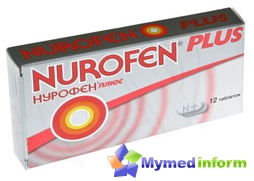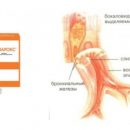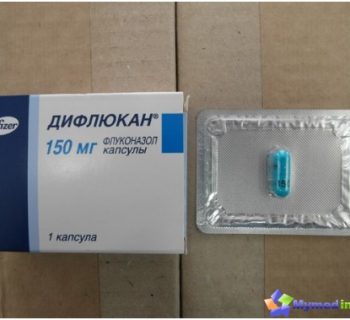None of us is insured against pain - head, articular, dental, after operations and injuries ... Sometimes the pain appears at the most inopportune moment, trying to break our plans, preventing the work, the upcoming meeting, travel, sports speeches. Then Ibuprofen tablets can come to the rescue. They are often prescribed to patients with complex treatment of surgeons, traumatologists, nephrologists, gynecologists, therapists, pediatricians. Yes, and sports doctors have it in their arsenal. Currently, many drugs appear under other trade names, the active substance of which is ibuprofen. Therefore, we decided our site to tell more about the pharmacological action of the drug, the testimony for use, contraindications and possible unwanted effects.

Facts from history and medication description

Ibuprofen Many consider one of the major and significant achievements of modern science - pharmacology. The history of the drug began in the 1950s. Then the research was approved in Europe, the purpose of which was the search or the creation of the so-called «Superepirin». That is, a drug was required, which would be similar in action with aspirin, But it was transferred much better than the means. And scientist succeeded, so in 1969 in England for the first time began to use ibuprofen. And the ancestor and ancestor of ibuprofen were salicylates - substances from plants with antipyretic and anti-oblast action, which were successfully used during the hypocratic times.
The dosage form looks like round bobble form pills. The kernel is white, and the surface is covered with a shell, the color of which can be light pink or bright pink. Active substance, that is, ibuprofen, in one tablet 200 mg. The composition includes auxiliary substances: food gelatin, starch potato, wheat flour, vanillin, bee wax, magnesium stearate, colloidal silicon dioxide, magnesium hydroxycarbonate, low molecular weight, titanium dioxide, sucrose, dye Azorubin.
Ibuprofen is a representative of non-steroidal anti-inflammatory funds (abbreviated NSAIDs). This is a derivative of phenylpropionic acid.
Now this drug has a large number of synonyms appeared, that is, the drugs, the active substance of which is also ibuprofen, simply produce these drugs different manufacturers and their price is significantly different.
Here are some of the synonyms: Bruphen, Nurofen, Buran, Salpflex, MiG 200 and MiG 400, Perophene, Freak, long.
What action possesses the drug?
Ibuprofen (Latin name IBUprofenum) has an analgesic (i.e., painful), anti-inflammatory and antipyretic effect. The mechanism of action is associated with inhibiting (blocking) synthesis of prostaglandins - substances responsible for the feeling of pain, hyperthermic reactions and inflammation. There is evidence that the drug enhances the production of endogenous interferon and has an immunostimulating effect. Another fact - now experts are studying the possibility of applying the drug for preventive measures and monitoring cancer of colon and Alzheimer's disease.
Indications for use

Here is a list of diseases, situations and cases when the use of ibuprofen for symptomatic therapy is recommended:
- Treatment of rheumatoid arthritis, polyarthritis, osteoarthrosis, gouty arthritis and other inflammation of the joints, spine;
- headache various etiology (associated with stress, depression, stress);
- menstrual pains;
- Migraines, Malgia, Neuralgia;
- heat for colds and infections;
- Postoperative Dental pain;
- Pain after injuries, including sporting origin.
How to apply ibuprofen?
Dosage picks up and appoints a doctor, taking into account the nature and causes of pain, as well as the age and condition of the patient. With pains in the joints and inflammation of children after 12 years and adults are prescribed by 200 mg (one tablet) 3 or 4 times a day. To enhance the effect, you can also take 2 tablets, that is, 400 mg 3 times a day. Then the dose again reduce. To make the drug faster and affected, the first dose takes to eat in the morning. But generally it is desirable to take a medicine after eating so that there are fewer side effects. You should not take more than 6 tablets per day. Without advice doctors drug take no longer 5 days.
If your child is less than 12 years old, then the dose is picking up the doctor, considering and the weight of a small patient.
When Ibuprofen is contraindicated?
Doctors do not prescribe the drug in the following cases:
- the presence of a pain of bronchial asthma;
- aggravation of ulcer-erosive and inflammatory processes in the stomach, intestines;
- Hemophilia and hypocoagulation of blood;
- bleeding in the stomach or intestines, intracranial hemorrhages;
- hemorrhagic diathesis;
- liver failure and serious kidney lesions, excess potassium in the body;
- in the period after the operation on the heart of the Aorticoronary shunting;
- with hypersensitivity to composite components of the drug;
- Individual intolerance to the NSAID, which can manifest rhinitis, urticaria or even bronchospasm;
- pregnancy.
With caution to apply during breastfeeding period. Pediatricians prescribe rectal candles, suspensions or syrups.
Side effects

It is believed that the drug is postponed much better than aspirin, diclofenac and indomethacin. Side phenomena are less common, but still mention them:
- Reduced appetite, heartburn, nausea, vomiting, diarrhea or constipation, very rarely - ulceration on the gastric mucosa and related bleeding;
- dryness or pain in the mouth, gum ulceration;
- Itching and skin rash, swelling of quinque;
- anaphylactic shock;
- heat, strengthening, allergic rhinitis, anemia;
- shortness of breath or bronchospasm;
- insomnia, dizziness, headache, irritability and anxiety;
- noise (ringing) in ears or reduced hearing;
- Tachycardia, sometimes raising blood pressure, heart failure;
- depression, drowsiness, confusion, hallucinations;
- Very rarely - bone in the eyes or obscure vision, eye dryness, eyelidity and conjunctiva;
- Changes in the composition of blood - agranulocytosis, thrombocytopenia, leukopenia.
If the phenomena listed above arise, then it is necessary to refuse to receive medicine and report this to the doctor.
Does the drug interact with other medicines?
It is not recommended during the period of intake of ibuprofen to use also acetylsalicylic acid, since in this case the ability of the acid is reduced to thin the blood and hamper the thrombosis.
With simultaneous reception with anticoagulants and thrombolitics there are risk of bleeding.
Ibuprofen enhances the effect of insulin and other drugs that reduce blood glucose indicator.
There are still a number of drugs whose joint use with ibuprofen can lead to intoxication and strengthen side effects.
Whether overdose is possible?
Yes, if the drug is used in the wrong doses, then the following symptoms that spell overdose can appear: nausea, vomiting, accompanied by abdominal pain, drowsiness, noise in ears, heart rate disorders, in severe cases - Stop breathing and coma.
In such situations, the patient makes a stomach washing, give Activated carbon and diuretic products. If necessary, symptomatic therapy is assigned.
special instructions
To avoid side effects, the drug must be taken in the correct dosage, short courses.
If still long-term treatment is required, it is carried out under the control of blood, kidney and the patient's liver.
On the days of reception not to use ethanol (ethyl alcohol).
With caution to use people whose work requires the speed of reaction and increased attention.
Ibuprofen is produced in tablets of 200, 400 mg, in suppositories, ointments, creams, gels, syrup.
Store in a home first aid kit to be unavailable to children.
Ibuprofen is considered highly efficient and rapid by the drug. It will easily save from pain of various origin. In order for the drug to benefit, it is necessary to get acquainted with its possible by-phenomena and contraindications. Our site recommends that your readers certainly consult with a doctor and pharmacist.









